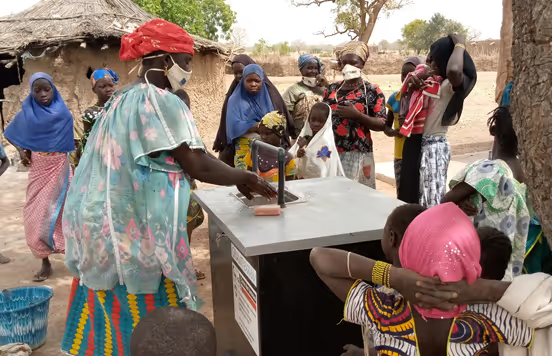Scaling Innovation in a Rapid Onset Crisis

Project overview
This project introduces reusable, antibacterial menstrual underwear and washing and drying bags, addressing the need for accessible, quality MHM products in high severity areas. The solution is low-cost, culturally sensitive, and environmentally friendly, revolutionising MHM in challenging contexts.
Project solution
This project offers [specific solution or intervention] to tackle [challenge]. By implementing [strategies, tools, or innovations], the project aims to achieve [desired outcomes]. The approach is designed to [specific actions or methods] to bring about meaningful change in [community, region, or issue area].
Expected outcomes
This project aims to achieve [specific outcomes], such as [measurable results, improvements, or changes]. The expected impact includes [benefits to the target community, advancements in research or innovation, or long-term effects]. By the end of the project, we anticipate [specific changes or milestones] that will contribute to [broader goals or objectives].
WHAT HUMANITARIAN NEED IS BEING ADDRESSED?
In rapid-onset crises, women and girls often lose access to menstrual hygiene products, private washing facilities, and safe disposal options. Managing periods becomes extremely difficult, leading to health risks, stigma, and exclusion from daily activities. The project responds to this urgent need by providing low-cost, culturally appropriate menstrual hygiene products and supporting safe, dignified menstrual management. It aims to protect health, restore dignity, and enable women and girls to participate fully in community life, even during emergencies.
WHAT IS THE INNOVATIVE SOLUTION AND HOW WILL IT IMPROVE EXISTING HUMANITARIAN PRACTICE?
The innovation lies in introducing reusable, antibacterial menstrual underwear and washing/drying bags, which we believe are highly adaptable in rapid-onset crises. Unlike typical emergency responses that rely on disposable pads, this approach offers a more sustainable, cost-effective, and culturally appropriate alternative. These products are compact, easy to distribute, and designed for repeated use, reducing logistical challenges and waste. They support safe, dignified menstrual hygiene management even when infrastructure is damaged or access to water is limited. This solution improves existing humanitarian practice by addressing immediate needs while promoting longer-term sustainability and dignity for women and girls in emergency settings.
EXPECTED OUTCOMES
Expected outcomes include a comprehensive evaluation of the products’ effectiveness, usability, and acceptance in rapid-onset crisis settings. The project will gather user feedback and assess the impact on health, dignity, and hygiene practices in emergency conditions. It will also produce practical guidance and educational materials to support humanitarian actors in distributing and promoting the use of these products effectively. The aim is to generate evidence on the feasibility and relevance of reusable menstrual hygiene solutions in emergencies, helping to inform and improve future humanitarian responses.
FIELD-TESTING LOCATIONS
Lebanon – partner: Nabad:
- Beqaa valley – informal settlement Syrian refugees
- Beirut– Palestinian refugees
- SouthLebanon – Lebanese IDPs
Gaza – partner: Juzoor & Aisha:
- Gaza city and the north, to displaced and conflict impacted communities
Project delivery & updates
Stay up to date with the latest developments from this project. Here, you will find details on what has been delivered, resources created, and regular updates as the project progresses. Access key documents, reports, and other materials to see how the project is making an impact.